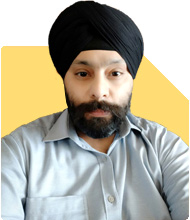Ramalingam Kalirajan |7831 Answers |Ask -Follow
Mutual Funds, Financial Planning Expert - Answered on May 18, 2024
He has an MBA in finance from the University of Madras and is a certified financial planner.
He is the director and chief financial planner at Holistic Investment, a Chennai-based firm that offers financial planning and wealth management advice.... more

Hello sir... I m 23 year starting work.. as school teacher..I live with my family ..plus ..I don't have other expense.. from freelancing I have corpus of 4 lakh in mf . I do sip of 20 to 30 k depending on what money I save in month. I want to know how should I set goal & should I use etf?... I invest in index fund, small cap( quant,axis).
Setting Financial Goals
It's essential to start by defining your financial objectives, whether it's building an emergency fund, saving for higher education, or planning for retirement. Setting clear, achievable goals provides a roadmap for your financial journey.
Understanding Your Current Financial Situation
Take stock of your current financial position, including your income, expenses, assets, and liabilities. Understanding your cash flow enables better decision-making and ensures that your financial goals are realistic and attainable.
Designing a Goal-Oriented Investment Strategy
Based on your risk tolerance and investment horizon, it's crucial to design an investment strategy aligned with your goals. Here's how to proceed:
Emergency Fund: Prioritize building an emergency fund equivalent to at least 3-6 months' worth of living expenses. This fund provides a financial safety net to cover unexpected expenses or loss of income.
Long-Term Goals: As a young investor with a longer investment horizon, consider allocating a portion of your portfolio towards equity mutual funds for wealth accumulation. These funds offer the potential for higher returns over the long term, albeit with higher volatility.
Asset Allocation: Diversification is key to managing risk and maximizing returns. Allocate your investments across different asset classes such as equity, debt, and potentially gold, based on your risk appetite and financial goals.
Exploring Investment Options
While you're already investing in mutual funds through SIPs, consider exploring other investment avenues such as Exchange-Traded Funds (ETFs). Here's a brief overview:
ETFs: ETFs offer several advantages, including lower expense ratios, intraday trading flexibility, and transparency in portfolio holdings. They track specific market indices or sectors and can be a cost-effective way to gain exposure to a diversified basket of stocks.
Active vs. Passive Management: While index funds and ETFs passively track market indices, actively managed funds aim to outperform the market by selecting individual stocks. Both approaches have their merits, and the choice depends on your investment philosophy and preferences.
Conclusion
As you continue to progress in your career and accumulate wealth, it's crucial to remain disciplined and focused on your financial goals. Regularly review your investment portfolio, stay informed about market developments, and adjust your strategy as needed to ensure long-term financial success.
Remember, financial planning is a journey, not a destination. By cultivating good financial habits and seeking professional guidance when needed, you're laying the foundation for a secure and prosperous future.
Best Regards,
K. Ramalingam, MBA, CFP,
Chief Financial Planner,
www.holisticinvestment.in
You may like to see similar questions and answers below
Ramalingam Kalirajan |7831 Answers |Ask -Follow
Mutual Funds, Financial Planning Expert - Answered on Aug 13, 2024
Ramalingam Kalirajan |7831 Answers |Ask -Follow
Mutual Funds, Financial Planning Expert - Answered on Aug 13, 2024
Ramalingam Kalirajan |7831 Answers |Ask -Follow
Mutual Funds, Financial Planning Expert - Answered on Aug 01, 2024
Anu Krishna |1483 Answers |Ask -Follow
Relationships Expert, Mind Coach - Answered on Feb 05, 2025
Inderpaul Singh |5 Answers |Ask -Follow
Leadership Coach - Answered on Feb 05, 2025
Anu Krishna |1483 Answers |Ask -Follow
Relationships Expert, Mind Coach - Answered on Feb 05, 2025
Anu Krishna |1483 Answers |Ask -Follow
Relationships Expert, Mind Coach - Answered on Feb 05, 2025
Inderpaul Singh |5 Answers |Ask -Follow
Leadership Coach - Answered on Feb 05, 2025
Ramalingam Kalirajan |7831 Answers |Ask -Follow
Mutual Funds, Financial Planning Expert - Answered on Feb 05, 2025
Ramalingam Kalirajan |7831 Answers |Ask -Follow
Mutual Funds, Financial Planning Expert - Answered on Feb 05, 2025
Radheshyam Zanwar |1175 Answers |Ask -Follow
MHT-CET, IIT-JEE, NEET-UG Expert - Answered on Feb 05, 2025
Dr Dipankar Dutta |749 Answers |Ask -Follow
Tech Careers and Skill Development Expert - Answered on Feb 04, 2025
Milind Vadjikar |971 Answers |Ask -Follow
Insurance, Stocks, MF, PF Expert - Answered on Feb 04, 2025

























